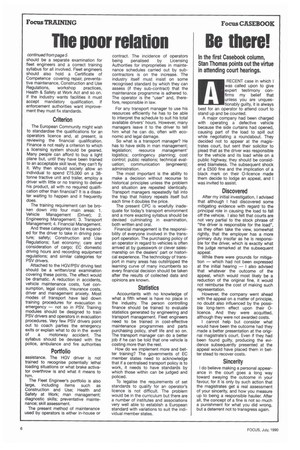The poor relation
Page 8

If you've noticed an error in this article please click here to report it so we can fix it.
continued from page 5 should be a separate examination for fleet engineers and a correct training syllabus for all involved. Fleet engineers should also hold a Certificate of Competence covering repair, preventative maintenance. Construction and Use Regulations, workshop practices, Health & Safety at Work Act and so on. if the industry wants facilities it must accept mandatory qualification. If enforcement authorities want improvement they must fix standards.
The European Community might wish to standardise the qualifications for an operators licence and, at present, is reviewing the financial qualification. Finance is not really a criterion to which a licensing system should be geared. Many people can afford to buy a light plane but, until they have been trained to an acceptable skill level, they can't fly it. Why then should society allow an individual to spend 275,000 on a 38tonne tractive unit and trailer, employ a driver with little or no training to deliver his product, all with no required qualification other than financial? It is a disaster waiting to happen and it frequently does.
The training requirement can be broken down into four main areas: 1. Vehicle Management (Driver); 2. Engineering Management; 3. Transport Management; 4. Financial Management.
And these categories can be expanded for the driver to take in driving posture; safety; Construction and Use Regulations; fuel economy; care and consideration of cargo; EC domestic driving hours and recording equipment regulations; and similar categories for PSV drivers.
Attached to the HGV/PSV driving test should be a written/oral examination covering these points. The effect would be dramatic. A reduction in accidents, vehicle maintenance costs, fuel consumption, legal costs, insurance costs, driver and management anxiety. Most modes of transport have laid down training procedures for evacuation in emergency — not so in PSV. Training modules should be designed to train PSV drivers and operators in evacuation procedures. Very few PSV drivers point out to coach parties the emergency exits or explain what to do in the event of a motorway accident. The syllabus should be devised with the police, ambulance and fire authorities assistance. The HGV driver is not trained to recognise potentially lethal loading situations or what brake activator overthrow is and what it means to him.
The Fleet Engineer's portfolio is also large, including items such as Construction and Use; Health and Safety at Work; man management; diagnostic skills; preventative maintenance; skill assessment.
The present method of maintenance used by operators is either in-house or contract. The incidence of operators being penalised by Licensing Authorities for improprieties in maintenance schedules carried out by subcontractors is on the increase. The industry itself must insist on some recognised standard by which they can assess (if they sub-contract) that the maintenance programme is adhered to. The operator is the "user" and, therefore, responsible in law.
For any transport manager to use his resources efficiently he has to be able to interpret the schedule to suit his total available drivers' hours. However, many managers leave it to the driver to tell him what he can do, often with economic and legal damage.
So what is a transport manager? He has to have skills in man management; legislation; resource management' logistics; contingency planning; cost control; public relations; technical evaluation; communication (engineers); administration.
The most important is the ability to make a decision without recourse to historical principles unless the problem and situation are repeated identically. Transport managers repeatedly fall into the trap that history repeats itself but each time it doubles the price.
The present CPC is woefully inadequate for today's transport environment and a more exacting syllabus should be devised culminating in examination, both written and oral.
Financial management is the responsibility of everyone involved in the transport operation. The purchasing policy of an operator in regard to vehicles is often arrived at by guesswork or clever salesmanship on the dealers' part or historical experience. The technology of transport in many areas has outstripped the learning curve of many incumbents so every financial decision should be taken after the results of collected data and opinions are known.
Accountants with no knowledge of what a fifth wheel is have no place in the industry. The person controlling finance should be trained to evaluate statistics generated by engineering and transport management. Fleet engineers need to be trained in cost-effective maintenance programmes and parts purchasing policy, shelf life and so on. The transport manager can do a better job if he can be told that one vehicle is costing more than the rest.
How do we implement more and better training? The governments of EC member states need to acknowledge that if a centralised transport policy is to work, it needs to have standards by which those within can be judged and policed.
To legalise the requirements of set standards to qualify for an operator's licence is not difficult. The problem would be in the curriculum but there are a number of institutes and associations very well able to establish a European standard with variations to suit the individual member states.




































































































